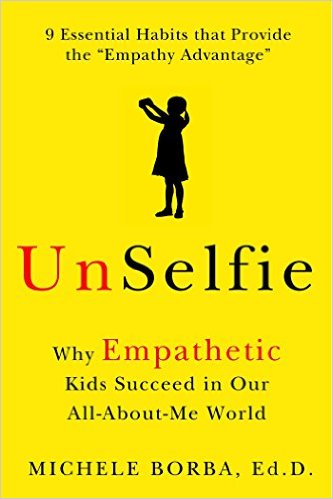How to cultivate a giving spirit and raise a charitable child
Samantha is not yet 4 years old, but she already has the makings of a charitable child. She was distributing school supplies with her family to kids at a shelter and noticed one child in a corner didn’t have a backpack. She picked up a spare, walked to him and said, “I sorry you don’t have one. I hope you happy.”
The preschooler may have missed a few words. But her message displayed empathy and a charitable spirit, all because her parents were raising her to care about others. And the benefits of doing so? Oh, let me count the ways.
Over and over, researchers are finding that empathy is the cornerstone for becoming a happy, well-adjusted, successful adult. Studies show that possessing empathy also makes children more likable, more employable, better leaders, more conscience-driven, and even increases their .
The best news is that empathy can be cultivated, and one of the best empathy generators are service projects to help kids step out of their comfort zones, open their eyes, and expose them to others’ lives. And there are other proven ways to raise an empathetic child as well. Here are simple, science-backed tips adapted for this article from my book, UnSelfie: Why Empathetic Kids Succeed In Our All-About-Me World to inspire generosity in your children 365 days a year:
1. Prioritize caring.
Harvard University’s Making Caring Common Project report, “The Children We Mean to Raise: The Real Messages Adults Are Sending About Values,” found that most teens value academic achievement and individual happiness over caring for others. Their reason for this? Kids believed that’s what adults value.
Prioritize charitableness in your family chats. Be clear that you expect them not only to do their academic best, but to care about others. Display photos of your kids engaged in thoughtful endeavors, rather than just showcasing their school successes, athletic prowess or having them look cute for the camera, so they recognize that how much they care about others matters to you.
2. Be a charitable role model.
The old saying, “Children learn what they live,” has a lot of truth to it. Studies show that if parents are generous and giving, kids are likely to adopt those qualities. So show your child the joy you get by giving.
There are so many daily opportunities: phoning a friend who is down, collecting blankets for the homeless, volunteering at a food bank. After volunteering, be sure to tell your child how good it made you feel.
3. Make giving a family routine.
A simple way to inspire children’s generosity is by reinforcing it. Keep a box by your backdoor to encourage family members to donate their gently used toys, games or books. Then each time the box is filled, deliver the items as a family to a shelter or needy family. Make charity a routine ritual that becomes a cherished childhood memory.
4. Acknowledge charitableness.
Whenever your child acts in a kind-hearted way, say so: Thank them for being kind or helping out. Also, let your kids overhear (without them thinking they’re supposed to) you describing their caring qualities to others.
5. Use real events.
Instead of just bemoaning bad news, talk about how you might help in the local community. It could be donating items to help after a widely publicized fire, or thinking about ways to assist the most vulnerable – like the homeless – during the winter. You can start at home, too, such as teaching them to be there for a family member who is going through a hard time.
6. Start a “giving plan.”
Encourage your children to give a portion of their allowance – or tooth fairy money – to a charity of their choice. Provide three small plastic containers for younger kids or envelopes for teens that are labeled: “Save,” “Spend,” and “Give,” and help them decide which percentage of their money is to be allocated to each container.
7. Find your child’s passion.
Kids are more likely to want to get involved in service projects that match their interests. Help your kids choose something they’re good at and enjoy doing. If he loves reading: read to the blind; enjoys writing: be a pen pal to an overseas orphan; likes sports: volunteer for the Special Olympics; is musical: play at a homeless shelter; enjoys knitting: knit a beanie for a soldier. You get the idea.
8. Make charity a family affair – or share the experience with friends.
Find a service to do together, like serving in a soup kitchen. If your child enjoys volunteering with friends, ask if she’d like to do her project with someone. Or your child can form a club with neighbors, classmates, members of their scout troop or a church group.
9. Recap their impact.
Research has found that children who are given the opportunity to help others tend to become more helpful, especially if the impact of their helpful actions is pointed out. So encourage your child to reflect on her volunteering experiences: “What did the person do when you helped? How do you think he felt? How did you feel? Is lending a hand easier than it used to be?” And do remind your kids that their caring efforts are making a difference.
10. Keep giving.
A once-a-year day of volunteering is rarely enough for a child to adopt a charitable mindset. Look for ways to help your children experience the joy of giving on a regular basis: baking an extra batch of cookies for the lonely neighbor next door, adopting an orphan overseas (a portion of their allowance each week goes to that child), singing to a nursing home to add a little joy. The goal of getting kids involved in charity is not about winning the Nobel Peace Prize, but to give them the opportunity to experience goodness.
 The truth is, kids don’t learn how to be kind from reading about it in a textbook, but from doing kind deeds. The more children witness or experience what it feels like to give, the more likely they will develop a charitable spirit. And that’s how we’ll raise the next generation to be good, caring people.
The truth is, kids don’t learn how to be kind from reading about it in a textbook, but from doing kind deeds. The more children witness or experience what it feels like to give, the more likely they will develop a charitable spirit. And that’s how we’ll raise the next generation to be good, caring people.
What are you doing to help your children learn the value of giving to others?
Best!
Michele
I’m so excited to announce the publication of my new book, Thrivers: The Surprising Reasons Why Some Kids Struggle and Others Shine on March 2. For forty years I’ve wondered why some kids have a strong, “We’ve got this!” attitude and discovered the science of resilience. Thrivers are made, not born. Thrivers is packed we science-backed ways we raise mentally and morally strong kids who are prepared to live and thrive in an uncertain world. I hope you like it!
For more 300 more ideas on how to raise empathetic, kind-hearted, charitable kids you might want to check out my latest book, “UnSelfie: Why Empathetic Kids Succeed In Our All-About-Me World.” It’s been a ten-year researching and writing process to gather proven practices to raise empathetic kids. My goal is to start a national conversation about the need for empathy and how the immensely human trait that can be cultivated is anything but soft and fluffy but gives our children an immense advantage.



